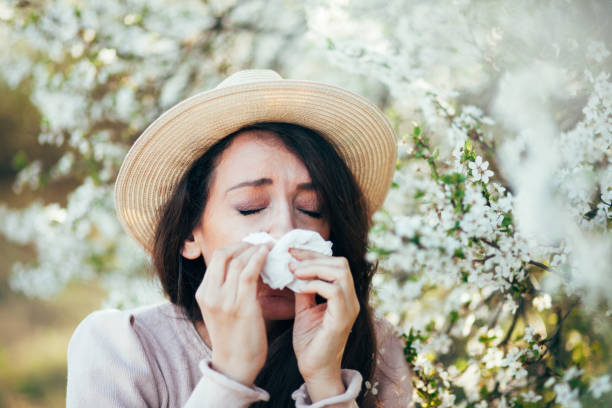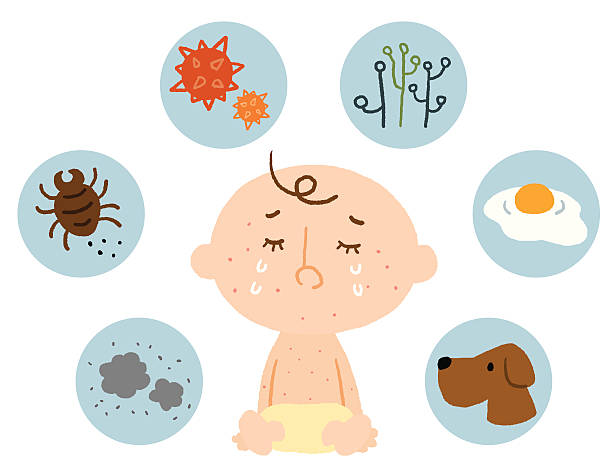Allergies are your body’s misguided reaction to a substance, including food, animal dander, pollen and dust that it is has become hypersensitive to.
If you eat a particular food, or stroke a cat and suddenly start sneezing or break out in hives, you are (or rather, your body) is allergic to them.
Your immune system produces antibodies. When you have an allergy, these antibodies identify a particular allergen as harmful, even when it isn’t.

The type of allergy and the severity differ from person to person. They can be a mild irritation to a serious anaphylaxis, here it can be a potentially life threatening situation.
What causes allergies?
You develop allergies when your body decides that it is hypersensitive to a particular irritant and develops antibodies to fight against it. When you come into contact with the irritant, your antibodies release immune system chemicals which then cause the allergy.

There are a whole host of allergies. In order to better understand them, they have been divided into sections that define them.
Airborne allergens:
These are the irritants that travel through the air. Pollen is a huge allergen, as is dust, animal dander and mold.
Certain foods:
Nuts, including peanuts are high on the list of allergens. Lamb, heat, shellfish, eggs, fish and milk can also cause an allergic reaction.

Insect stings:
The most common of these is a bee sting. Asps and mosquitoes can cause an allergic reaction too.
Medication:
Some people are highly allergic to penicillin, or penicillin based antibiotics.

Substances that you touch:
Latex can cause an allergic skin reaction. Your body reacts to the proteins in natural rubber latex. Some hair dyes, hair and makeup products and nickel that is found in certain jewelry items can also cause an allergic reaction.
Are allergies inherited?

Quite often, the tendency to develop allergies is inherited. They can be passed through genes of the parents to their children. While a parent has a particular allergy, it doesn’t necessarily mean that his children will also have the same allergy.
The Journal of Allergy and Clinical Immunology published a study in 2012 that showed that not only are allergies inherited, but that they are also gender related. This study indicates that if a mother suffers from allergies, she is more than likely to pass on the allergy to her daughter. The same applies to men and their sons. It is interesting to note that it was not 1 particular type of allergy, but rather an allergy.
The main exception to this is penicillin. This allergy is not gender specific and can be inherited from either of the parents, or only 1 parent.
What is an allergic reaction?
This is, in a nutshell, how your body responds to an allergen. There is a chain of events that happen as part of an allergic reaction.

First of all, when you are first exposed to the allergen, for example, cat fur, your body will respond by producing allergic antibodies (IgE). What the antibodies do is find the allergens in your body and help to try and remove them. (Remember, the antibodies ‘believe’ that the allergen is bad for you.) As a result of this, a chemical called histamine is released. The histamine causes the symptoms of the allergy.
Are allergies dangerous?

You might know of a friend who carries little blue allergy tablets with her wherever she goes. Perhaps she has a strong allergy to bee stings. If she were to get stung by a bee, her body would have a severe allergic reaction.
A severe allergic reaction is called an anaphylaxis reaction and is potentially life-threatening. In your friend’s case, if she is stung by a bee and does not take her medication, she may have difficulty breathing, and her throat and tongue may swell. She also may lose consciousness.
This is a severe allergic reaction and should be immediately treated.

Your friend may carry Phenergan or Fenezal tablets with her in case she is stung by a bee. They are little round blue tablets. They work by blocking the histamine that the body produces during an allergic reaction. Additionally, it also works directly on the brain to help the patient feel more relaxed.
If your friend does not have these tablets, she may carry an Epinephrine auto-injector with her. She would require an emergency injection of this and then would have to see a medical practitioner immediately.
An injection of emergency epinephrine could save a person’s life after an anaphylactic reaction.
This is an example of a dangerous, or severe allergic reaction. Another allergen that can be highly dangerous is a reaction to penicillin.
Most allergies are not as severe

The severity of allergy symptoms does depend on the individual. Some people react quickly and strongly when they are exposed to an allergen. Others are more fortunate in that they have mild symptoms.
Allergy symptoms are generally classified as mild, moderate and severe.
A mild allergy reaction includes local symptoms. In other words, they affect a certain area of your body. An example is if you are mildly allergic to pollen, you are likely to experience watery and red eyes, sneezing, runny nose and itchiness. The symptoms don’t spread to other parts of your body.
When you have a moderate allergy reaction, the symptoms can spread to other parts of your body. These can include itchiness, selling, hives, and possibly trouble breathing.
A severe allergy reaction is sudden and it can also affect your entire body. Usually the first symptom is really bad itching on your face or eyes. It can then spread to other parts of your body and include cramps and pain in the abdominal area, vomiting, diarrhea, hives and swelling.
I had a bad reaction after eating peanut butter – do I have an allergy?

If you have a reaction to something that prior to the incident, never caused any reaction, you may have developed an allergy to it. It is best to see the doctor as soon as possible and not wait until the reaction symptoms have gone away.
A doctor will perform a series of tests to determine if you are allergic to what caused the reaction. He may refer you to an allergy or immunology specialist.
One of the tests is an allergy skin test. This is done by pricking your skin with an extract of the allergen and then checking your skin’s reaction. It is a proven and popular test for allergies.
If this type of test cannot be done, blood work may be necessary. Interestingly, this test is not as conducive as a skin test. It merely evaluates the number of antibodies that your immune system has produced. When you have a higher level of certain antibodies, you may possibly be allergic to that allergen.
I have an allergy – how do I manage it?

The first step would be to try and avoid the allergen as much as possible. So if you have a peanut butter allergy, rather don’t purchase it. If there is peanut butter in your home, the person using it must make entirely certain that there are no remains of peanut butter here you might accidently come into contact ith it.
Medications are likely to be prescribed by your doctor. These can include antihistamines, decongestants, and steroidal nasal sprays.
If an allergic reaction triggers an asthmatic type reaction, it is likely that the doctor ill prescribe inhalers and injected medication.
If the medications prescribed are not 100% effective in controlling the allergic reactions, your doctor may suggest immunotherapy or allergy oral immunotherapy. The first is a series of injections, whereas the second is taken by mouth. They are suitable for people who have allergic rhinitis or allergic asthma, or both.
Different causes and types of allergies
As you know, there are many causes for an allergic reaction.
Pollen:
One of the biggest causes of allergies, pollen travels through the air. Most people who suffer from allergies aggravated by pollen have an allergy called seasonal allergy rhinitis or hay fever. Exposure to the pollen causes inflammation as well as the selling of your nose and the protective tissue of your eyes.

You’re likely to sneeze a lot, wheeze, have a runny and stuffy nose, and itchy and watery eyes.
Dust mites:
These tiny organisms, so small that you can hardly see them, live in the fibers of your carpets. The dust is found just about everywhere, including in the fibers of your carpets, mattresses, pillows and upholstery.

The symptoms are similar to those of a pollen allergy.
Animal dander:
Hen your pooch seats, his seat glands secret a protein that are shed in dander. The dander can cause an allergic reaction. Symptoms can vary, but generally are similar to allergic reactions from pollen and dust mites.
Mold:
These are tiny fungi that have spores and float in the air, much like pollen does. Mold is usually found in damp places, so your bathroom that is routinely damp, is a great place for mold to start growing.

It can set of an allergic reaction, and is typically active during hot, humid weather.
Insect venom:
This is usually a bee, wasp or mosquito sting. Most people have a mild allergic reaction from a sting from one of these insects. However, it can be potentially dangerous if the sting causes a severe allergic reaction.
Food:
Some food causes allergies.

The most common of these includes lamb, pea nuts, wheat, egg, shellfish and tree nuts. Symptoms can include itching, hives, swelling around the mouth, vomiting, nausea and diarrhea.
Latex:
This is another trigger for allergies. It is caused by the proteins in the rubber used to make the latex. A latex allergy usually starts after a person has been working with latex for awhile.

For example, if you need to use latex gloves in the course of your work, you may find that your skin starts to itch or sell as a result of using latex gloves. The reaction can be mild such as redness of the hands and itching. However, it can also be more severe with symptoms like wheezing, hives, shortness of breath and eye tearing and irritation.
The majority of allergic reactions from latex are mild to moderate. There are cases here the allergic reaction can be severe. In this case, it is strongly suggested that if you have a latex allergy that you wear a medic alert bracelet stating so, and carry an Epinephrine auto-injector.
Living with allergies
Allergies can be bothersome and sometimes dangerous, but all in all, you can live a normal life with allergies.

If you are aware of what typically triggers an allergic reaction, you can avoid them as best you can.
Eating healthily can also help you manage your allergies. Choose a healthy diet and avoid processed and packaged food. The same applies to any food that has chemical flavorings and preservatives.
Drinking enough water ensures that you are well-hydrated and can help flush your system of impurities.
Take your prescribed medication according to the doctor’s instructions. While the medication is not going to cure or eliminate the allergy, it will ensure that you can control and manage the allergy so you can live comfortably.
If you suddenly develop a reaction to something when you’ve never had one in the past, it may be that you have developed an allergy. It is best to visit your doctor and have it checked. It is also important to schedule an appointment if the reaction is ongoing. Finding out what it is can help you manage it better.
Allergies can be managed
Having an understanding of what causes an allergy and why your body has an allergic reaction goes a long way in helping you manage the allergies you have.

